
Microsoft's Craig Mundie
Stop the R&D train, I want to get off
As planning for a new EU research effort begins, many are calling for changes in the way the system works, writes Richard L. Hudson [...read more]
Mundie argued that major scientific breakthroughs are less likely to happen as a result of research projects approved in advance by large numbers of people, pointing out that DARPA, the famed US Defense Advanced Research Projects Agency, doesn’t use peer review to allocate grants, yet has been responsible for many of the most successful publicly-funded research projects, including development of the Global Positioning System.
The peer review system is also at odds with the approach taken in venture capital funding of science and technology, where a single person or a small group makes investment decisions. Mundie noted that VCs tend to back talented people with promising ideas on the basis that perhaps one-in-ten will found a highly-successful company, and called on governments to focus more of their funding on backing truly visionary scientists, such as Nobel Prize winners.
Such an approach, Mundie suggested, will accelerate progress in dealing with the so-called grand challenges, such as climate change and the cost-effective provision of healthcare.
But different rules are needed for public versus private funding, Clara de la Torre, director of institutional relations and legal matters for the Framework Programme at DG Research, said in response to Mundie’s remarks. “This might be a very good approach for private funding, but when you are dealing with tax payers’ money, how do you decide who has the legitimacy to award research grants directly without peer review?”
The debate over peer review has been simmering in Brussels for the past few years, as the EU tries to increase the impact of its R&D funding. Past reviews of the Commission’s flagship Framework Programme have criticised it for funding too much mediocrity, in an effort to knit together the EU-wide research community and encourage the development of R&D capabilities in less-developed member-states.
In response, the Commission in 2007 launched the European Research Council (ERC) with a brief to fund excellent research only. Modelled on the US National Science Foundation, the ERC awards grants solely on competition among applicants, rather than on the basis of needing to give each member state a fair share of the grants. Applications are judged by panels of senior scientists, in a high-level form of peer review. Since then, the ERC has been widely praised in Brussels as a force for encouraging excellence in EU research programmes.
But the ERC is only 15 per cent of the total €52.5 billion Framework Programme 7 – and so a debate has been building on whether to extend its peer-review approach to other parts of Framework.
While some of the participants at the Science|Business symposium pointed out that allocating grants on the basis of peer review has worked well for the ERC, several delegates agreed with Mundie that the peer review system can result in less ambitious research projects.
And another problem is looming: that of the need to apply computational methods across all fields of science. In his opening remarks at the symposium, Mundie warned that the gap between the most “avant-garde” people in computer science and information technology, and their peers in other scientific disciplines is widening, meaning that most fundamental research projects fail to harness the potential of the latest computing technology to support breakthroughs in other fields.
Scientists don’t tend to consider the potentially transformative role of computation early enough in the development of a research project, thinking of it more like electricity, Mundie noted. “Everything is very incremental,” he said. “One of the great challenges is to break this incrementalism.”





 A unique international forum for public research organisations and companies to connect their external engagement with strategic interests around their R&D system.
A unique international forum for public research organisations and companies to connect their external engagement with strategic interests around their R&D system.